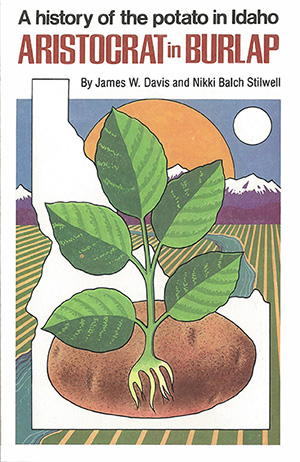He was using an Iron Age potato planter and anticipating delivery of the fertilizer, he ordered a fertilizer attachment from the manufacturer in North Dakota. The device arrived, the fertilizer was delivered on the siding, and he started to plant the crop of potatoes. The material itself was packaged in burlap bags tied at the top with wire. It was unlabeled and of a yellowish color.
When the planting operation began, Simplot found that he could not adjust the fertilizer attachment to apply the plant food at a low-enough rate. It became obvious that the carload of fertilizer was not going to cover the entire 40-acre field. After struggling with the device, he finally told the operator to go ahead and use up the fertilizer as far as it went, and plant the rest of the field without the benefit of the new product.
Simplot said that at harvest time he learned one of the most startling lessons of his lifetime. In the portion of the field where the fertilizer had been applied, the crop of potatoes was beautiful. They were large, of good quality, good type, and the yield was heavy. Where the fertilizer supply had run out "was where we ran out of potatoes," according to Simplot. The increase in yield and quality was so startling that Simplot became an enthusiastic advocate of the use of fertilizer in growing potatoes. He found it extremely difficult to get anyone to agree with him on recommending fertilizer, but he went about the task with missionary zeal. The fertilizer industry was in its infancy and supplies of nitrogen and phosphate fertilizers were extremely difficult to get. The problem finally led to Simplot's decision to produce his own fertilizer, which has become a large and lucrative division of his enterprises.
Having become the largest shipper of fresh produce in Idaho, Jack Simplot was not satisfied. He was looking for additional worlds to conquer. The advent of World War II created new demands and markets. Simplot's attention was called to the fact that his produce company in western Idaho was making sales of Idaho-grown sweet Spanish onions to a customer in California who seemed prepared to pay a good price for the commodity.
Simplot had decided to find out how a California processor could buy onions in Idaho at a high price and still make a profit, so he followed one of the onion shipments to Vacaville, California, where it was consigned to the Basic Vegetable Corporation. Basic Vegetable had a contract from the United States Quartermaster Corps to dehydrate onions for military use. Jack reasoned that if the onions could be shipped to California and dehydrated there, the dehydration could also take place in Idaho at a savings in transportation costs and would probably constitute a new profit source for his business.

